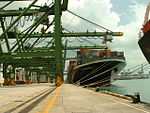International Trade Centre
| International Trade Centre (ITC) | |
|---|---|
| Formation | 1964 |
| Headquarters | Geneva, Switzerland |
| Official languages | English, French, Spanish |
| Website | www.intracen.org |
| A series on Trade |
| World trade |
|---|
 |
|
Policy
|
|
Economic integration |
The International Trade Centre (ITC) is a subsidiary organization of the World Trade Organization (WTO) and the United Nations Conference on Trade and Development (UNCTAD) and provides trade-related technical assistance. Whereas the WTO mainly deals with the rules of international trade and UNCTAD with research and advocacy, ITC's mandate is far more narrow as it is solely concerned with helping (so-called) developing and transition economies to promote their exports. The pure focus on technical assistance is rare within the UN system as most other organizations that provide technical assistance usually engage in multiple areas and kinds of assistance.
ITC has its headquarters in Geneva and one field office in Mexico City.
History
ITC is the successor of the International Trade Information Centre, which the General Agreement on Tariffs and Trade (GATT) established in 1964 “for the purpose of assisting the export promotion efforts of the developing countries” by providing them “with information on export markets and marketing, and to help them develop their export promotion services and train the personnel needed for these services.”[1] In an effort to streamline the United Nation's export promotion efforts, an agreement was reached between the GATT, which at that time and in contrast to its successor, the WTO, was part of the United Nations system, and the newly established UNCTAD, to merge the activities of the two organizations by creating a joint subsidiary. The agreement was reached in 1967 and the International Trade Centre (the explicit reference to "information" was dropped) was officially established on 1 January 1968.[2]
Technical assistance offering
ITC's service offering is nowhere described in a systematical way. Thus, the following description necessarily contains inaccuracies. ITC offers numerous different services to its beneficiaries. In doing so it differentiates between three groups of target beneficiaries: Policymakers[3] trade-support institutions,[4] and enterprises. Some services are specifically designed for one of these groups while others have a universal character. In principle, there is no predefined list of services that ITC is limited to: Services are being developed depending on requests of beneficiary countries or donors.
Since the latest major restructuring between 2006-2009, ITC itself categorizes its services in five thematic clusters called "business lines": Export Strategies, Business and Trade Policy, Trade Support Institution Strengthening, Exporter Competitiveness, and Trade Intelligence.[5]
In addition to falling into one of these business lines, each of ITC's services can be categorized according to the way it is being provided, i.e., as a publication, trade intelligence database, capacity building (i.e., training), or advisory service.[6]
For illustration purposes, capacity building in the area of exporter competitiveness could represent a training to enterprises about how to overcome technical barriers to trade and a database in the area of trade intelligence could represent an online database for international trade in goods and services.[7]
Executive Directors
ITC had since its creation in 1964 six Executive Directors. Twice in its history the position was vacant: in the early Seventies and the early Nineties.[8]
ITC's Executive Director is a senior international civil servant of the United Nations with the level of Assistant Secretary-General.[9] ITC's Executive Director as well as the Deputy-Executive Director are appointed by the heads of its two parent organizations: the Director-General of the WTO and the Secretary-General of the UNCTAD.[10]
| Name | Start of tenure | End of tenure | Nationality |
|---|---|---|---|
| Herbert L. Jacobson | 1964 | 1971 | USA |
| vacant | 1971 | 1975 | - |
| Victor E. Santiapillai | 1975 | 1979 | Sri Lanka |
| Padinjarethalakal Cherian Alexander | 1979 | 1981 | India |
| Goran Engblom | 1981 | 1992 | Sweden |
| vacant | 1992 | 1994 | - |
| J. Denis Bélisle | 1994 | 2006 | Canada |
| Patricia Francis | 2006 | 2013 | Jamaica |
| Arancha Gonzalez | 2013 | Spain | |
See also
References
- ↑ GATT (1967), “Joint GATT/UNCTAD Trade Centre: Note by the Director-General”, L/2890 (6 Nov 1967), page 7
- ↑ See General Assembly Resolution 2297, document symbol A/RES/2297(XXII).
- ↑ Policymakers denotes representatives of high-level government authorities. The large majority of policymakers that ITC deals with are from Ministries of Trade or Economy.
- ↑ "Trade support institution" is an umbrella term for all kinds of public and private formal institutions that reduce transaction costs in trade. A formidable example are trade promotion organizations such as the International Trade Administration in the USA, which have as objective to develop and promote exports from their home country or region. Other trade support institutions include, for example, Chambers of Commerce and Industry or customs authorities.
- ↑ See ITC's own presentation of its business lines and their connection with ITC's different beneficiary groups: http://www.intracen.org/about/itc-structure/.
- ↑ Stephen Browne and Sam Laird 2011, "The International Trade Centre: Export Impact for Good", Routledge.
- ↑ See for example ITC's TradeMap: http://www.trademap.org.
- ↑ For short bios of each of the six Executive Directors, please see Stephen Browne and Sam Laird 2011, "The International Trade Centre: Export Impact for Good", Routledge, pages 31-32.
- ↑ For an overview of all positions paid out of ITC's regular budget, please see the biennial budgeting and planning documents of the UN General Assembly. For example: General Assembly 2009, Proposed programme budget for the biennium 2010-2011 Part IV International cooperation for development Section 13 International Trade Centre UNCTAD/WTO, Document symbol A/64/6 (Sect. 13)/Add.1. The UN's Official Document System (http://documents.un.org/) provides a convenient search tool for such documents.
- ↑ http://www.wto.org/english/thewto_e/coher_e/wto_itc_e.htm
External links
| |||||||||||||||||||||||||||||||
| |||||||||||||||||||||||
|
